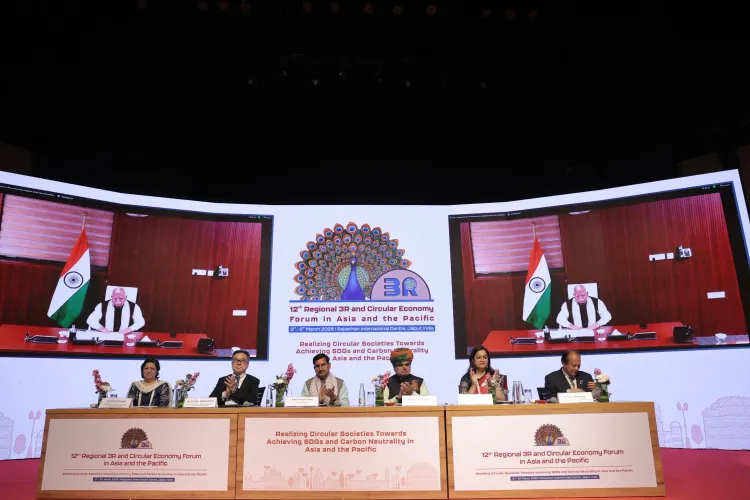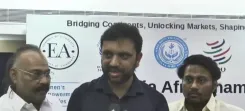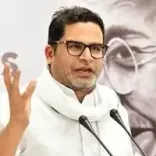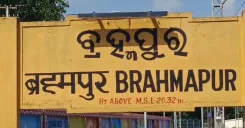Rajasthan: Conclusion of the 3R and Circular Economy Forum in Asia and the Pacific

Synopsis
Key Takeaways
- Jaipur Declaration adopted unanimously.
- Launch of Cities Coalition for Circularity (C-3).
- Focus on 3R principles: Reduce, Reuse, Recycle.
- High-level participation from 24 Member States.
- Introduction of CITIIS 2.0 for waste management.
Jaipur, March 5 (NationPress) The 12th Regional 3R and Circular Economy Forum in Asia and the Pacific wrapped up with the unanimous endorsement of the ‘Jaipur Declaration’ by Member States on Wednesday.
This forum took place from 3rd to 5th March 2025 at the Rajasthan International Centre in Jaipur, drawing participation from 24 Member States across the Asia-Pacific region and approximately 200 international delegates.
India has suggested establishing a multi-stakeholder global coalition, the Cities Coalition for Circularity (C-3), as a collaborative platform for sharing knowledge.
The ‘Jaipur Declaration’ encompasses various waste stream targets, resource efficiency objectives, and sustainable material consumption strategies. It also tackles issues surrounding the informal sector, gender equality, and labor conditions, while detailing implementation strategies, partnerships, technology transfer, funding mechanisms, and research and development initiatives.
During his closing remarks via video link, Union Minister Manohar Lal highlighted that the ‘Jaipur Declaration’ symbolizes the collective commitment of UN Member States towards a circular transition.
He noted that, although not legally binding, this decade-long declaration will steer India and other Asia-Pacific nations towards sustainability.
He also underscored India's leadership in establishing the Coalition of Cities for Circularity (C-3) and welcomed all UN Member States to participate. Tokhan Sahu, Minister of State, Ministry of Housing and Urban Affairs, characterized the forum as a landmark event, emphasizing the necessity of the 3R principles (Reduce, Reuse, Recycle) and the circular economy.
Professor Amit Kapur, Chair of the Institute for Competitiveness at Stanford University, gave a special address on circular waste management solutions for the Maha Kumbh in Prayagraj, presenting initial findings on sustainable waste management practices.
The forum featured high-level participation, with Union Minister for Housing and Urban Affairs Manohar Lal inaugurating the event alongside Ministers from Rajasthan, Madhya Pradesh, Uttarakhand, and Haryana. Ministers from Japan, the Solomon Islands, Tuvalu, and the Maldives were also present.
Approximately 800 delegates from 33 Indian States and Union Territories, 15 ministries, the private sector, and technical institutions attended the event. Representation included 75 cities (9 international and 66 Indian cities). A total of 120 speakers contributed across 29 plenary sessions, 10 thematic sessions, six country breakout sessions, and seven side events.
A virtual platform was also established for broader participation. Key announcements during the opening session aligned with India's commitment to sustainability.
The Prime Minister’s message underscored India’s Pro Planet People (P-3) approach. To support this initiative, the Coalition of Cities for Circularity (C-3) was introduced as a multi-stakeholder and multi-nation alliance, enabling city-to-city collaboration and private sector engagement through a digital platform.
Moreover, a significant milestone was reached with the launch of CITIIS 2.0, a Union Cabinet-approved program. Agreements worth Rs 1,800 crore were signed under this initiative for integrated waste management and climate action in 18 cities across 14 states.






